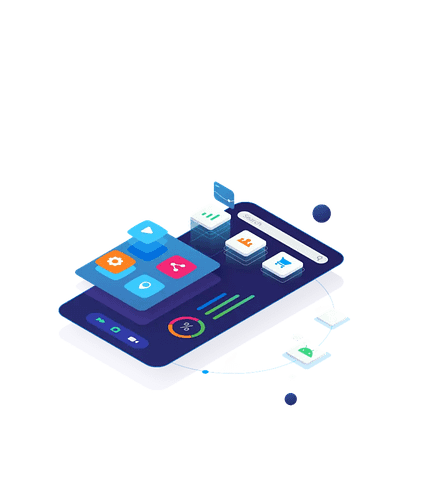
In this digital era, a mobile development framework is crucial because it will help you to execute your ideas. Developers today leverage various mobile application development frameworks and libraries to create interactive products.
The demand for Android and iOS apps is increasing at a significant pace. Hence, developers are very particular about mobile frameworks, platforms, technologies, and databases to churn out exemplary products.
That’s not just the end of the story. With the increasing market for cross-platform and hybrid app development, the importance of such development frameworks is also on the rise. Developers and development companies are diligent in making the right decision at the back end to deliver products that can compete in the market.
In this blog, we will discuss different frameworks for mobile app development that are the best in their league. The market deems these frameworks better than the rest for their features and functionalities. If you’re looking for a framework that meets your needs, we will also offer a list of different products to choose from. By doing so, we aim to assist you in picking the framework that will meet you and your client’s requirements.
What is a Mobile Application Development Framework
A mobile application framework is a platform where developers can create software. The framework consists of software and tools, compilers, a programming interface, and tools for debugging. It is the developer’s responsibility to develop the source code for the application and its framework. For such purposes, developers employ different elements for different devices.
One of the benefits of mobile application frameworks is that they help developers handle basic or low-level tasks through reusable code. This way, professionals do not have to waste time developing the application from scratch. Instead, they dedicate their time and attention to improving functionality.
Types of Mobile Application Development Frameworks
There are different mobile application development frameworks available for developers to develop a state-of-the-art application. Each of such frameworks features different platforms and technologies that professionals use to create distinct applications.
Here, we will check out some of the frameworks for developing mobile applications. So, let us get right into it:
1. Native Mobile App Development Framework
It is a native framework for platform-specific developments as it works for only one platform, which could be Windows, Android, or iOS.
2 .Web App Development Framework
Web App Development Framework can access websites, regardless they use a mobile device or a computer. Web applications are programs that work online.
3. Hybrid Mobile App Development Framework
The life of a developer becomes much easier by working with Hybrid mobile app development frameworks. In this framework, code is written once, and mobile applications are developed that can run on a lot of platforms with no extra effort.
Hybrid applications can run on both Android and iOS. Its code can also be reused for web applications and even for desktop applications. Making the most of these advanced frameworks is done by developers and business owners, which is useful for developing hybrid mobile applications more cheaply.
5 Top Mobile App Development Frameworks for 2023
1. React Native
React Native is a framework of JavaScript for natively rendering and writing real mobile applications for Android and iOS. Many businesses have adopted React Native worldwide, including Microsoft, Facebook, and Uber. By using this framework, developers can use the same codebase to create an application for various platforms and can also utilize this to use in their Android and iOS apps. The strategy is beneficial for saving both time and resources.
Features
- It is Open Source
- Modification is easy
- Reloading is live
- Works best in a mobile environment
- It speeds up the development
- It is cost-effective
2. Flutter
Flutter is a UI framework that is free and open-source, and it is used for creating native mobile applications. By using Flutter, developers can build different mobile applications with a single programming language and a single codebase. Flutter makes the development of Android and iOS apps faster.
Software Development Kit (SDK) and widget-based UI library are a part of the Flutter framework. Different reusable UI elements are found in this library, for example, buttons, sliders, and text inputs.
Developers use a programming language called Dart for building mobile applications with the Flutter framework.
Features
- It is open-source
- Similar Business Logic and UI
- The time to develop code is reduced
- It has a widget library
- Identical to the performance of the Native app
- Platform-Specific-Logic Implementation is simple.
- Widgets are given in Flutter
3. Kotlin
Kotlin is a framework that is developed by JetBrains for building Web applications. For providing an easy-to-use and idiomatic API and high scalability, it makes use of coroutines. Any host that supports applications based on Java or Kotlin can be deployed on that, which includes Google Cloud Platform, Amazon Web Services, and so on.
Features
- It is safe and reliable
- Cost is low
- It is compatible with all Android versions
- It provides backend support
- It has built-in support
- At runtime, it reduces crashes
- The syntax is clean and compact
- The smart Cast function is also present in Kotlin
4. Ionic
It is an open-source UI toolkit, and it is ideal for the development of modern, high-performance cross-platform apps for a single codebase. It is an open-source framework for creating a hybrid mobile app SDK. It uses the AngularJS framework and is wrapped in HTML5 and CSS. It also uses Cordova to access native device functions. Ionic allows developers to build Hybrid apps with amazing UI, which act like native apps and depend on a single shared codebase.
Features
- Your written code runs successfully on the web, Android, and iOS.
- It allows developers to compile and shuffle apps at every stage of development.
- Ionic has embedded AngularJS by default and allows the build of scalable applications.
- Its usage is free, along with many community-generated plugin integrations.
5. Xarmain
Developers leverage Xamarin as a tool for cross-platform application development. It assists engineers to share a greater part (up to 90%) of the code across other major platforms. Being a comparatively new tool, it is based on the Microsoft technology stack and already has a community of over 1.4 million developers. You can ignore the way Xamarin approaches mobile application development. The framework extends the .NET developer platform through tools and libraries that facilitate the development of apps for Android, iOS, tvOS, watchOS, macOS, and Windows.
Xamarin is used for cross-platform mobile application development. Across major platforms, it allows engineers to share up to 90% of code. As it is a new tool, it is based on the Microsoft technology stack. Over 1.4 million developers are part of its community. When we are discussing the key approaches to mobile app development, it’s impossible to ignore Xamarin. It outstretches the .NET developer platform with tools and libraries. It is extended for developing Android, iOS, Windows, macOS, tvOS, and watchOS apps.
Features
- It is highly safe and secure.
- Code is reusable
- Its Maintenance is easy
- It provides cross-platform support
Conclusion
The field of mobile app development is expanding quickly. You should be aware of the top mobile application development frameworks because they will help you choose which framework works well for you. These top 5 mobile application development frameworks have proven to be the most valuable for all types of businesses.
Finding the best Software Development Service in the US might be difficult for some people. If you want to develop a mobile application that differentiates itself from other competitors, then you should take services from software development service providers. They will create the best mobile app for your business.



